#Ayşe Sultan
Explore tagged Tumblr posts
Text


This golden headband was first worn by Anastasia Hatun (later Kösem Sultan) in the third episode of the first season of Magnificent Century: Kösem. It was used again in the twenty-seventh episode of the same season on Kösem's daughter Ayşe Sultan.
#Muhteşem Yüzyıl: Kösem#Magnificent Century Kösem#Magnificent Century Kosem#period drama#costume drama#historical drama#Anastasia Hatun#Mahpeyker Hatun#Kösem Sultan#Kosem Sultan#Ayşe Sultan#Ayse Sultan#Ayşe Sultan (Daughter of Kösem)#recycled jewellery#reused jewellery
27 notes
·
View notes
Text

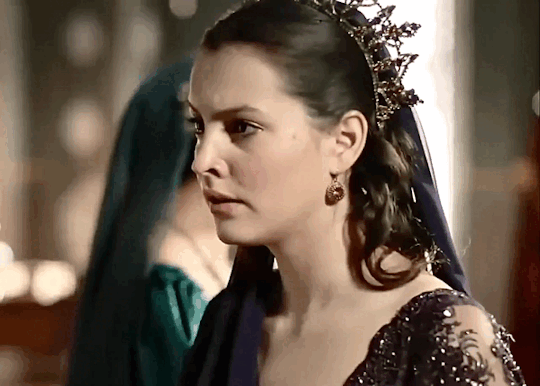
✱ Ayşe Sultan (Leyla Feray) — Magnificent Century: Kosem Ep.45
#magnificent century kosem#ayşe sultan#haseki ayse sultan#magnificent century: kösem#magnificent century#mc: kosem#muhteşem yüzyıl kösem#gifs
28 notes
·
View notes
Text

Hamide Ayşe Sultan (15 November 1887 – 10 August 1960) was an Ottoman princess, the daughter of Sultan Abdul Hamid II and Müşfika Kadın.
2 notes
·
View notes
Text

OK but Hürrem hugging Ayşe Hümaşah like this is so cute
6 notes
·
View notes
Text

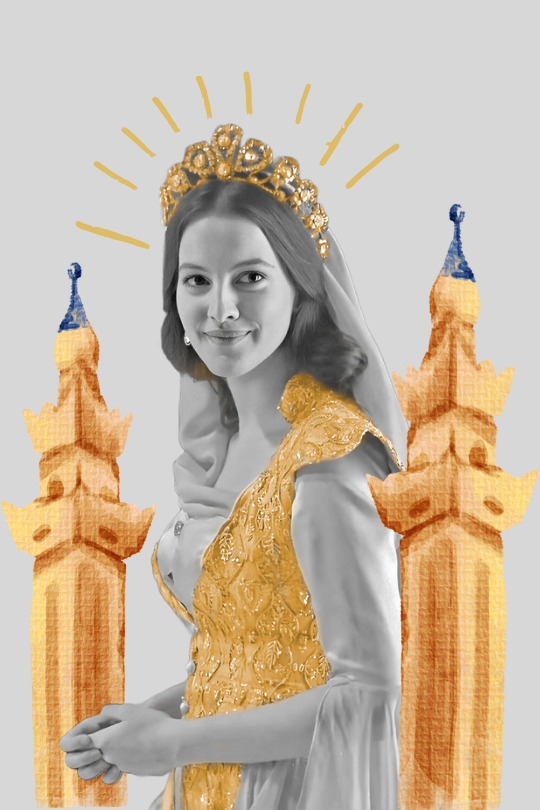

Haseki Ayşe Sultan, consorte de Murad IV
#ottoman woman#murad iv#magnificent century: kösem#mckedit#haseki ayşe sultan#muhteşem yüzıl: kösem#graphic
26 notes
·
View notes
Note
How would Sultan Süleyman mother and sister feel for Concubine reader and their children?? Would they also become yandere for them or no?

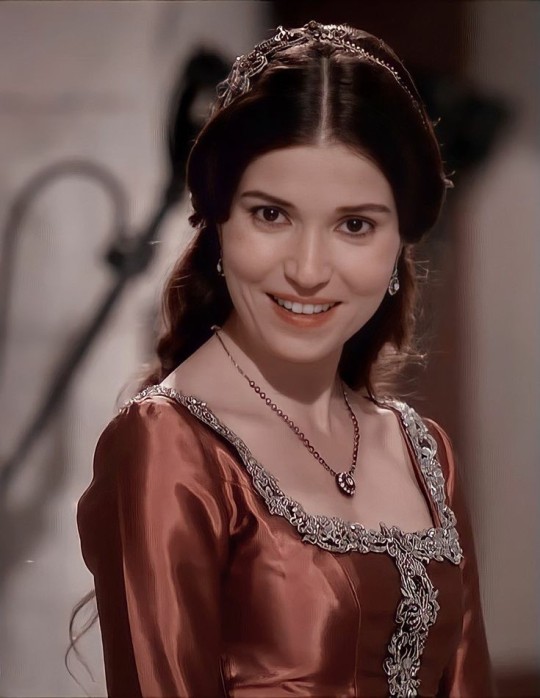

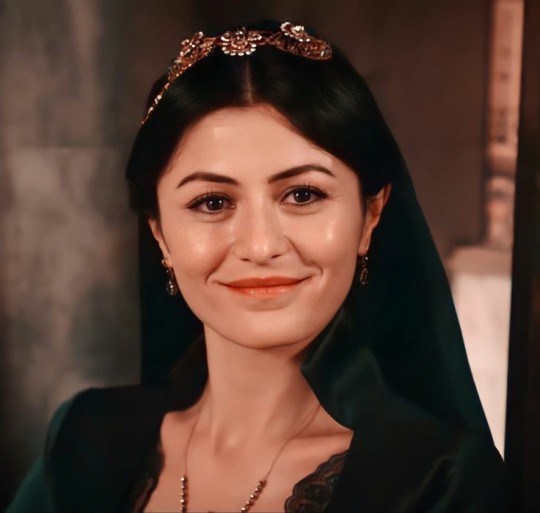
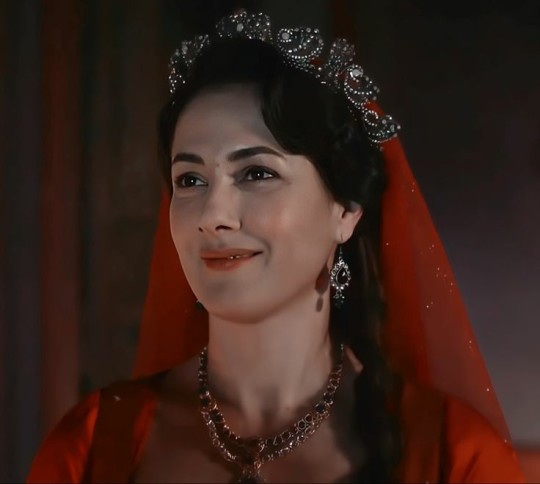
Nice question. Hafsa Sultan keeps her distance at first. However, he soon develops yandere tendencies for Concubine and her grandchildren. Hafsa Sultan does a great job at hiding her tendencies. Everyone thinks that Hafsa Sultan loves and protects Mahidevran and Mustafa. Actually, they are very wrong. Hafsa Sultan loves and pampers the Concubine and her grandchildren. He is protective of them. No one can disrespect or harm the Concubine and her grandchildren. He likes to chat with the Concubine and spend time with her grandchildren.
Hatice Sultan develops the first yandere inclination towards the concubine and her nephews. His other sisters also join him in this trend. At the latest, the tendencies of Shahuban Sultan will be revealed. However, all of them are protective against the Concubine and her nephews. The daughters of Hafsa Sultan do not stop pampering and supporting them. All will strive for their well-being.
#yandere magnificent century#magnificent century#yandere suleiman the magnificent#muhteşem yüzyıl#yandere ottoman empire#ottoman history#ottoman empire#yandere ayşe hafsa sultan#yandere hatice sultan#yandere beyhan sultan#yandere şah sultan#yandere fatma sultan#yandere character#yandere historical characters
112 notes
·
View notes
Text
VERY IMPORTANT MATTERS
Top of Topkapi (Tier 2)
This is up to Episode 12 of Season 1.
If you don't see someone here, is because the Top 3 were in the previous poll.
No, Hürrem is not here either because so far she just doesn't register for me due to the character (this is not about the actress at all, btw, as isn't the rest).
Yes these are the valid(e) options.




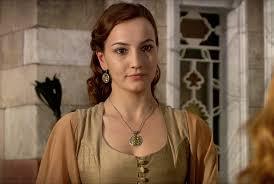
Feel free and encourage to discusse btw.
Respect the hatunlar tho, of course, or Daye will beat you to death.
#magnificent century#muhteşem yüzyıl#magnificent tumblring#magnificent memes#sultan suleyman#ottoman history#dizi review#I will only vote after a few votes are in#this is way harder for me than the last one#ok one of them is a murderer but to fair she's just the only one that succeeded yet#ayse is in competition for the most gaslit character so far#ahmet pasha is the secret fifth option#my feelings here are very conflicted#there will be a men's round in the future#gülnihal deserves special mention because she has wolverine powers btw#gülfem and ayşe are respected members of the “just doing my JOB here” club#Hatice gained massive points after the Dark Sultana moment in episode 12
20 notes
·
View notes
Text
















Magnificent Century: Kösem + Faceless: Ayşe Sultan
#kosemedit#Muhtesem Yuzyil kosem#magnificent century kosem#Muhteşem Yüzyıl Kösem#Ayse Sultan#Magnificent Century: Kösem#mc: kosem#Faceless Sultanas#weloveperioddrama#perioddramaedit#period drama#historical drama#Awkward-Sultana#The Dagger’s Wound#The Arrows of Justice#Love is Death#violence tw
40 notes
·
View notes
Text
Mistakes in the Magnificent Century part III
(title, ranks and traditions)
Some facts might be the same or very similar to the ones in previous parts,but they will be discussed from different angle.
1. Valide Sultan title
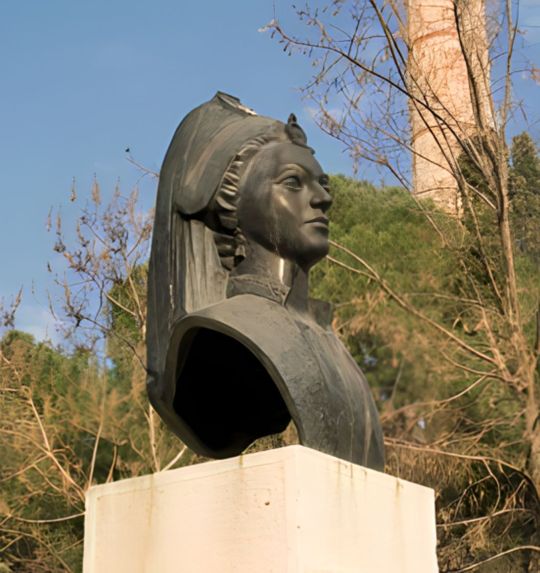
As I have spoken in the previous chapters, pre 1520 mothers of sultans were not sultans at all, they were titles as hatuns, though treated with utmost respect. In 1520 as Suleiman the Magnificent ascended the throne, he bestowed the title of Sultan to her mother Ayşe Hafsa, thus making her the first person in the ottoman history to become sultan from slavery. However, for Ayşe Hafsa being Sultan was not the same as the Valide Sultan that we know today. She was sultan yes, and she was the mother, so "Valide" was the proper address,from her children, as it was for every mother in the Ottoman empire, she was registered as "the mother of Sultan Suleiman", therefore in some sense, we can say she was not "Valide Sultan".
The first person,who actually made the "Valide sultan" a thing and officially registered herself was Nurbanu. So, the first Valide sultan with its full meaning was not Hafsa,but Nurbanu, who was registered as Valide Afife Nurbanu Sultan.
2. Haseki Sultan and Hürrem's marriage.
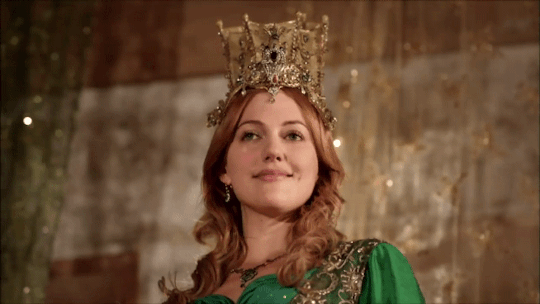
There were more than just several miscon- ceptions about the subject in the show.
First and foremost it was created specifically for Hürrem,so neither Hafsa nor Mahidevran have ever had the title. It also brought another mistake about Hafsa,that I will explain below,but now I will just make clearer how, when and why the status was created.
It was almost definitely created in mid-1534 after the death of Ayşe Hafsa Sultan and was probably legalised by their marriage, which by some sources is mentioned to be in 1533. If this is right, then it would mean, Suleiman married Hürrem before he gave her the status of Haseki and the marriage only freed her,but the most common and for me the most logical version is that after the death of Hafsa Sultan, Suleiman married her and gave her the title.
The death of Hafsa Sultan is a crucial part in the story, nor because she had some kind of objection towards Hürrem or her promotion,but the legal status of Hürrem reached its peak of necessity after her death. As we know, Ayşe Hafsa was a trusted ally and Confidant of uprising Sultan, even during his time as shehzade, so during the campaigns, his mother was the supervisor of the capital and his family, so the sultan could go to war without worrying about what he was leaving behind. However, after Hafsa's death things changed, Süleiman lost beloved mother and most trustworthy person around him, he needed to act immediately,as the campaign was near. He needed someone,whom he could entrust Harem, Family and the capital. His children were little, Sisters(whom by the way he trusted very much) were all married and Hürrem did not have a proper rank. It is said that he also discussed the candidate of high ranking harem servants, one and most promoted one of whom, in my opinion, would have been Gulfem, but he finally found the best possible solution that would affect his empire for centuries. He married Hürrem, gave her the rank of Haseki Sultan and left her in charge of the Harem, Family and the empire.
Hürrem became the first Haseki sultan in history.
Misusage of the title did not and here and there, not only the status and function,but even relevance of achievement was changed here. In the very first episode, Nigar kalfa made it clear that giving birth to a son, was enough to achieve it however, originally only the chosen ones could become Hasekis until its relevance faded during Murad's reign and completely lost exclusivity during Ibrahim's.
Essentially, the original function of haseki sultan was filling the absence of Valide, therefore only Hürrem and Nurbanu can be considered as the "original Haseki Sultans". Later many women were given the status, however the show made it wrong. Mahidevran,Mahfiruz and Halime never held it, however Şevikar, referred as Şevikar hatun in the show, was actually Haseki Şevikar sultan, the fifth Haseki of Ibrahim, three of whom, Ayşe, Mahinerv and Saçbağli, were left out, which is kind of understandable, because they had no importance in plot, unlike Turhan, never became Valide,unlike Saliha Dilaşub and Muazzez and had no influence on Ibrahim,Unlike Şevikar and Humaşah.
Their social standing is also misportrayed in the show, where Haseki ranks below and bows to imperial princesses, while in real life it was the other way around.
3. Daughters of Ottoman Princesses
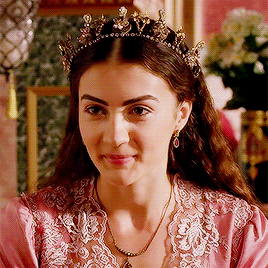
In the show, we met three daughters of the ottoman princesses: Esmahan,Huriçihan and Humaşah. They are referred to as Sultans,but in real life the daughters of imperial princesses were not called so,instead they had the title Hanimsultan and ranked even below the imperial consorts. The only exception to that was Humaşah, the daughter of Mihrimah Sultan, who received the title and prestige of the Sultan.
4. Harem Kalfa

In the show, they are just giving people the rank left and right. Nigar was already a high ranking, trusted servant of harem,but it turned out that she had only been there for 6 years. Fidan hatun was banished for attacking Sultan,but after a while she returned and became Kalfa, in Kösem melek hatun received rank out of the blue etc.
In real life, however, becoming kalfa was a long process. As we know,there were hundreds or even thousands of girls in the harem,but only a handful of them would become favourites,but what would happen to others? After ten years of being a harem resident some of them would have been transferred from harem and soon married off, some could by freedom, while others, usually the smartest and most responsible ones,would go to a special school that lasted two years, they would revive extensive training, both intellectual and physical, after that they could return in harem as teachers and overseers and if they were good enough they could promote.
There was actually quite a complicated hierarchy of harem servants,not only there were Kalfa's who had duty to supervise certain works like food or laundry(later even coffee),but there were administrative ranks, that they could achieve:
Mistress chief treasurer(Baş Hazinedar usta): she was head of the harem treasury.
Treasurers(Hazinedars): there were other hazinedars as well, who worked in harem treasury. Baş hazinedar usta was their direct superior.
Imperial Kalfa(Hünkar Kalfası): Personal kalfa of the padişah.
Lady stewardess(Kahya kadin/Kethüda Hatun): she ranked below imperial consorts,but her role raised during sultanate of women, when Gülfem and Çanfeda held the office, they were right hand women of Chief Harem managers(Hürrem and Nurbanu) therefore second in command of the Harem.
Senior Kalfa(Büyük Kalfa): Head of Kalfas, she was responsible for literally everything that was happening in the harem, sultans and şehzades treated her with respect and called "my kalfa" or "your grace"
Lady secretary: secretary of administrative organs of harem.
Junior kalfa( Küçük Kalfa): Senior kalfa was their direct superior. They had ranks within( second- ranking, third ranking, novice etc.) They were sometimes teachers and daily overseers.
Çanfeda for example entered the harem with Nurbanu, so in late 1530's or early 1540's. Nurbanu became favourite and went to Manisa, while Çanfeda remained in the old palace, in 1566 she was already a high ranking kalfa in the old palace, when Nurbanu called her. That would mean she was sent to train as kalfa in late 1540's or yearly 1550's, therefore she would have a decade or two to raise in ranks.
5. Princely harem.

In the magnificent century, prince usually gets his harem, whole in Topkapi palace, which is the lie through and through. They went even further and made up with the rule that the prince can not have a child with their concubine until they get their province to rule. Why would they be allowed to have concubines,but not having a child, when contraception is still unreliable.
Actually, their case was far more easier, princes would revive their sanjaks while still very young, their mothers, governesses and close servants would carefully choose their harem and leave the palace with their mother and full sisters. That also brought another mistake in the show. In the flashbacks, we can see Ayşe Hafsa and Hatice visiting Suleiman in Manisa, however Ayşe Hafsa along with Fatma and beyhan left for Manisa with Suleiman in 1512, while Hatice,being 4 years older than Suleiman, got married the same year.
6. Regency
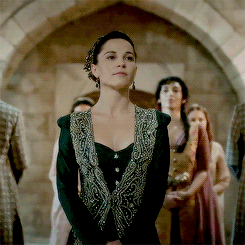
They introduced Kösem's regency as something unheard of,while completely neglecting Handan and Halime.
Handan was the first woman ever to rule as regents in her son's stead. She appointed viziers, discussed political matters and built a trusted circle for her son.
Halime was not officially registered regent but due to the insanity of her son, paşas asked her to rule the state after the rebellion she herself organized.
Kösem's and Turhan's regency is well known, so I will not speak about it.
7. Kösem's wedding

Not exactly the mistake as it is not proven, but as the event is highly unlike, I'll just put it there.
In 1609 it is said that Ahmed had four children with two women,but neither of them were married to him. In the two latters, one form 1612 and other from 1616, the 1612 letter straight out mentions her as sultan's concubine, who he loves the most and in 1616 she is mentioned as juts Haseki,but nothing is said about the marriage( I am not adamant about him not marrying her,I am just saying that it's unlikely, however I admitt she might indeed was concubine in 1612 and after the death of Mahfiruz, Ahmed married her and raised her stipend),however early in Kösem's regency vencians questioned ottoman practice, that mother of sultan was honoured and even given the regency,despite not being married to his father. As we know in Venice and generaly in Europe, source of power for woman was her marriage and not just motherhood. That is a time, when it was "unrevealed" that ahemd married her before he died,(if that latter is to be believed than Kösem and Ahmed did not marry in 1613), now it was actually thought that it was false information used by Kösem to strengthen her position in the eye of Venice as they needed friendly relation with them. That is not widely accepted,but it can be strengthened by the fact that Vencians still did not believe it, so perhaps they knew for sure that it was lie?
8. The death of Halime sultan and Mustafa.

In the show Halime, like many others, is victim of making Kösem seem more powerful, while Mustafa was killed by Murad. In real life, Mustafa died of natural causes, probably because of epilepsy in 1539, he was buried in Hagia Sophia and the coffin was placed in a mosque built for him. Halime is buried next to him and no permission of reburial was asked or granted, therefore Halime was not killed by Kösem, she went to the old palace and lived a long life.
9. 1517-1540
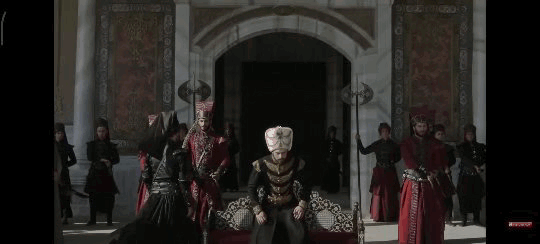
I'll be honest, I don't remember much of those episodes, they were boring and monotonous for me, but what I remember is one part from Kösem's iconic " The state you are talking about is mine" speech. She mentioned that she took over the reins of the state from Ahmed 15 years before the event, well that is a huge lie. Though the show runners tried to make Kösem all powerful, the invincible mastermind behind every single breath people drew in the empire,but she was actually quite powerless from time to time and the period between 1617 and 1623 is one of such. She was still young and inexperienced that time and main powerhouses in the empire were Halime and Osman's faction and she was not the leading force during any of the rebellions, she was allie of Halime, who, according to many historians, had major influence that time and the great impact on Kösem. Some even go as far as claiming that she persuaded Osman to kill Mehmed, so Kösem would take her side.
In short, Kösem did not have reins of sultanate for 15 years,but only about 10.
As I said, I don't remember much about the episodes, but from what I remember, Kösem had something to do with Murad's death. I'll be short on this: that's a lie.
10. Coup of 1648

The show made Kösem something of a filicidal tyrant. However, In real life her tyrannical tendencies appeared only after the death of Ibrahim, which he had nothing to do with. The ones behind the incident were Turhan and her faction. Kösem indeed took part in the Ibrahim's dethronement for the good of everyone,but mainly because she had seen the mad sultan dethroned,but lived. Mustafa had a similar situation,he was dethroned and locked in kafe, while his mother was sent to the old palace, which Kösem was absolutely willing to do. However, Turhan made her move and had Ibrahim executed to get rid of opposition for good, or perhaps because of the old resentment. Things did not go exactly as she had planned though, Kösem became regent and visibly started to avenge Ibrahim's death, it became clear that she was not going to hand over any power to Turhan and after she started to oppose even went as far as attempted dethronement of Mehmed(however she was not going to kill him.)
Therefore the child killing monster the show made her become is straight out a lie. One of her sons died of natural causes and the other was killed by outer forces, that she tried to avenge.
#history#historical drama#16th century#magnificent century#magnificent century kosem#mc: kosem#ottoman empire#ottomanladies#historical events#historical figures#sultanate of women#haseki hurrem sultan#hurrem sultan#nurbanu sultan#kosem sultan#safiye sultan#muhtesem yuzil kosem#historyedit#historical#ottoman sultanas#ottoman history#ottoman#mistakes in the magnificent century
202 notes
·
View notes
Text

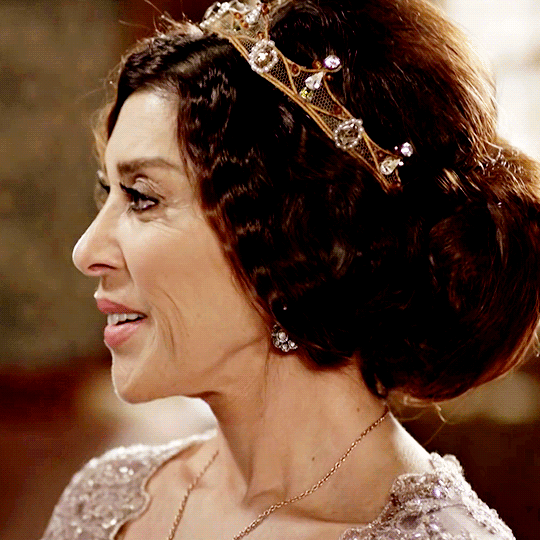
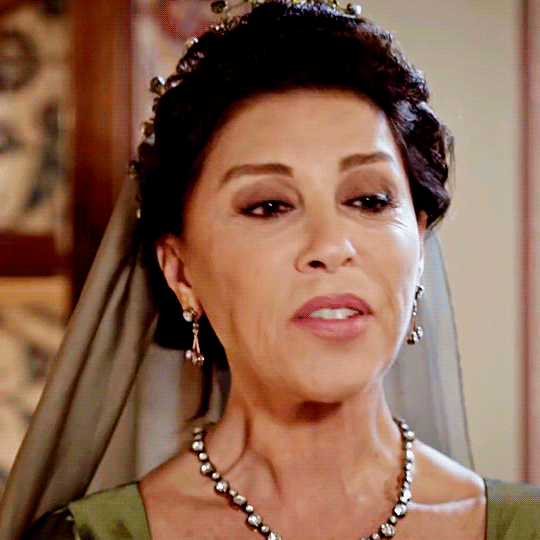


MAKE ME CHOOSE MEME | @shivrcys asked - Ayşe Hafsa Sultan or s4!Hürrem
#magnificent century#muhtesem yuzyil#ayse hafsa#perioddramaedit#periodedit#weloveperioddrama#onlyperioddramas#*ayse hafsa#*make me choose meme#everyone knows that I love hurrem but not in s4#that's why I chose hafsa :)
93 notes
·
View notes
Text



This golden tiara with green and orange stones was seen three times during the fourth season of Magnificent Century. It was first worn by Huricihan Sultan in the eleventh episode, then by Hümaşah Sultan in the twenty-ninth episode and lastly by Ayşe Sultan in the thirty-fifth episode.
#Muhteşem Yüzyıl#Magnificent Century#period drama#costume drama#historical drama#Huricihan Sultan#Hümaşah Sultan#Humasah Sultan#Ayşe Hümaşah Sultan#Ayse Humasah Sultan#Hümaşah Sultan (Daughter of Mihrimah)#Ayşe Hümaşah Sultan (Daughter of Mihrimah)#Ayşe Sultan#Ayse Sultan#Ayşe Sultan (Daughter of Şehzade Bayezid)#recycled jewellery#reused jewellery
20 notes
·
View notes
Text
lol, hafsa saying her one wish from god is to die as soon as possible so she won't live to see how hürrem ruins suleiman... the bombastic and dramatic is in the genes
#drama runs through the mc-verse ottoman dynasty's veins#and when the consorts join the harem the drama enters their cells too#muhteşem yüzyıl#muhtesem yuzyil#hafsa sultan#ayşe hafsa sultan#sultan süleyman#hürrem sultan#mc tag#i ramble
7 notes
·
View notes
Text
Sultan Vahdettin'in 3. eşi Müveddet Kadınefendi
Babası Kato Davut bey, Annesi Ayşe Hanım'dır. 24 Nisan 1911 tarihinde Sultan Vahdettin ile evlendi...
Günümüze Osmanlı torunuyuz diyenlere benzerltemedim..

28 notes
·
View notes
Text

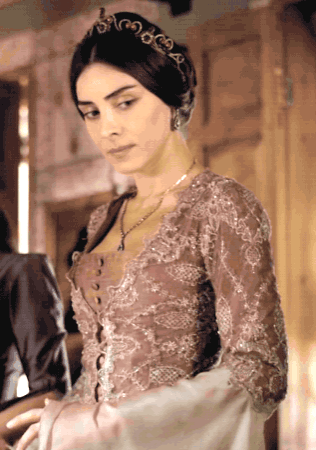

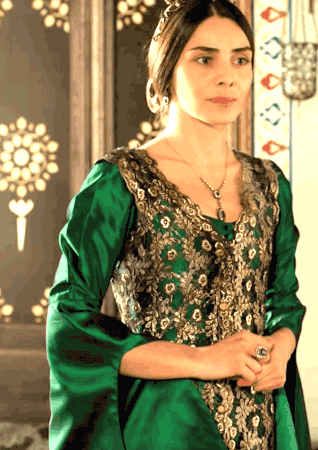
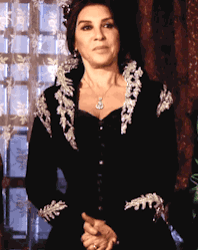
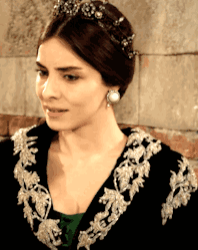




Same Costumes: Ayşe Hafsa Sultan and Mahidevran Sultan
@awkward-sultana 💓
#hafsa sultan#valide sultan#mahidevran sultan#nebehat çehre#nur fettahoğlu#muhtesem yuzyil#muhteşem yüzyıl#magnificent century#osmanlı#ottoman#perioddramaedit#periodedit#period rp#periodedits#period drama#period#perioddramasource#costume#colorful#flawlessbeautyqueens#femaledaily#dailywomanedit#dailyactresses#dailywomen#tumblr fyp
65 notes
·
View notes
Text
I have to say that Hürrem's relationship with Ayşe Hümaşah isn't very fleshed out but what we do have is very sweet.
No analysis. I just love how clearly affectionate it is. The fact that Ayşe Hümaşah moves towards Hürrem qhen she comes to rescue her and Mihrimah and Rüstem during the riots.
6 notes
·
View notes
Note
I wish to give an opinion of daughters of Ibrahim. There is a great abyys in lack of prooves to demarcate daughters of Ibrahim, Atike and Gevherhan. At times, I have an opinion that Atike existed, and at another times that she didn’t exist. For now, I favour the other theory, but i will talk one day about that topic more detailed.
Archiv für Kulturgeschichte Band 77 on page 65, that at the very end of reign of Sultan Ibrahim, Valide Sultan received 125 okka per month, daughters of Murad III named Hümaşah and Hatice received 7 okka per month, daughter of Murad III Fahri(han) received 10 okka per month, Kaya Sultan 16 okka per month, daughters of Ibrahim Gevherhan and Beyhan 30 okka per month and daughter of Ibrahim Fatma 50 okka per month.
Why would Gevherhan and Beyhan receive less stipend than Fatma, as Fatma was adopted and raised by Turhan? Btw, Fatma survived her husband, read Sakaoglu (actually, Ulucay proved it first). Also, in Acta et Diplomata Ragusina, Fatma is mentioned in 1658 document as widow of Fazli Pasha, nothing else is said unfortunately…
Anyway, I would claim that Ayşe Sultan binti Ibrahim really existed. See this quote from work The rise of the Köprülü family (p. 129):
For instance, when Prince Mustafa, the first son of Mehmed IV, was born in Edirne Palace in 1664, Ayşe Sultan, Gevherhan Sultan and Beyhan Sultan, sisters of Mehmed IV, were called to Edirne Palace from Topkapı to join in the celebration for the new prince. This summons shows that some members of the sultan’s family still resided in Topkapı Palace after 1663.
I consider her being the own sister of Mehmed IV. Kütükoğlu was only one right, he was married to Ibrahim’s Ayşe. Ahmed’s Ayşe really died in 1656, in document Vakfiler su defteri there is one document mentioning Ayşe Sultan died before 1660 (if I recall). Her last husband was Ibsir Mustafa Pasha. Sadly, Ibrahim’s Ayşe was wrongly confused also as Ibsir’s wife. Her one and only marriage was with Suleiman Pasha Malatuk (Ermeni). Alderson confused her with Murad IV’s daughter.
In work Atik şikâyet defteri (7 numaralı H.1081-1083/ M.1671-1672) transkripsiyon, Mehmed IV wrote several letters in 1671/72 to his sisters Ayşe and Gevherhan, and their husbands. He doesn’t refer them as hemşirem, but it’s them.
Anyway, in work OSMANLI DEVLETİ’NİN 1660-1661 (HİCRİ 1070-1071) TARİHLİ SEFER BÜTÇESİ (pp. 23-24), there were provided annual payments of some Ottoman princesses in 1661. This payment list does not refer to all of the Sultanas who were knowly alive in 1661, as Ahmed’s daughter Fatma Sultan for example. Only some of them.:
Hâshâ-i hazret-i Valide Sultan 12.000.000
Hâshâ-i paşmaklık-ı Ayşe Sultan 2.595.333
Hâshâ-i paşmaklık-ı Fatıma Sultan 2.005.000
Hâshâ-i paşmaklık-ı Rukiyye Sultan 1.235.000
Hâshâ-i paşmaklık-ı Safiye Sultan 1.005.000
Hâshâ-i paşmaklık-ı Beyhan Sultan 1.560.000 24
Hâshâ-i paşmaklık-ı Gevherhan Sultan 1.520.000
Hâshâ-i Ayşe sultan haseki-i merhum Gazi Sultan Murad Han aleyhi’r-rahmeti ve’l-gufran 100.000
Hâshâ-i paşmaklık-ı Ümmi Sultan 295.000
Hâshâ-i paşmaklık-ı Sâime Sultan 285.000
Hâshâ-i temlik-i merhum Kaya Sultan 1.250.000
See how Mehmed’s cousins (Murad IV’s daughters) and sisters (especially) received high payments, in difference to his aunt Ümmi Sultan and his great-great-aunt Saime Sultan. But, you would notice his sisters Ayşe and Fatma received the highest salaries; Ayşe the very highest as own sister, Fatma little lesser as adopted sister.
Sorry for the long wait, I have been incredibly busy these past few months.
About Ayşe binti Ibrahim, I would refer to this post, in which @rhaenahanzades found that the one married to Ermeni/Malatyalı Süleyman Pasha was Ayşe binti Ahmed I. I’ll paste the citation again, here:
“Soliman passa, Visir della Porta. Ritrouai anche alla Corte per Visir della Porta il Sr Soliman passa, stato un tempo Visir Supremo, dal quale fui all'udienza e lo presentai secondo le comissioni, il quale nell'honorarmi e trattarmi bene non uolse mostrarsi meno cortese degl'altri, offerendosi con molta humanità per ogni occorenza de publici seruitii. Questo Sr è assai noto all'EE. VV. per rellationi di diuersi loro ambassadori, onde a me non occorre tediarle in detto proposito. Dirò solo questo, che non le uol male e che sia personaggio da potterle fauorire, essendo ben uoluto da S. Mtà, col quale è ancor congiunto col uincolo di parentella, mentre la sua zia Aisce sultana tiene per moglie.” (“Dubrovačka akta i povelje” vol. 3, pages 661 and 662)
I believe Ayşe binti Ibrahim died pretty young and therefore never entered the Ragusian ambassadors’ lists of gifts.
As for Fatma binti Ibrahim, I must have missed when it was decided that she had been adopted by Turhan because I have never heard of this.
About the list of payments you’ve found, I’m not sure those princesses are identified correctly:

I have identified them based on seniority and the amount of money, which seems to me to be what their lands yield. I don’t think these are stipends.
Anyway, if we put the princesses in order of amount of money, I think it’d be easier to understand who is who:
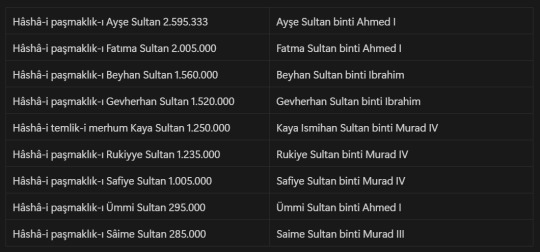
Ayşe and Fatma stand at the top of the hierarchy because a) they’re older and b) they must have amassed a great amount of land during their lives. After them we have the sisters of the reigning sultan (Mehmed IV), so Beyhan and Gevherhan (possibly in order of birth??); then we have Murad IV’s daughters (Kaya is mentioned as deceased because she was at the time), and lastly we have two minor princesses: Saime, a daughter of Murad III and a non-haseki concubine, and Ümmi, either a daughter of Ahmed I or of Murad III as well. I say this because I think their small amount of land means they were not daughters of Haseki Sultans: if Ümmi is Ayşe and Fatma’s sister that’s the only reason she would possess less land than them.
#ask post#ask: ottoman history#kehribar-sultan#ayse sultan daughter of ahmed i#fatma sultan daughter of ahmed i#rukiye sultan daughter of murad iv#safiye sultan daughter of murad iv#kaya ismihan sultan daughter of murad iv#beyhan sultan daughter of ibrahim i#gevherhan sultan daughter of ibrahim i#saime sultan daughter of murad iii#ummi sultan daughter of mehmed iv
11 notes
·
View notes